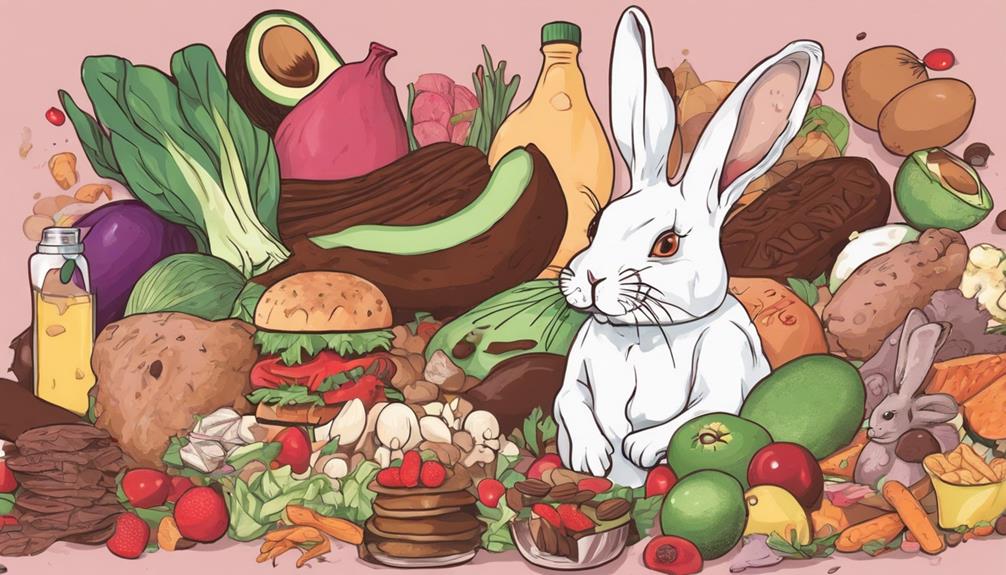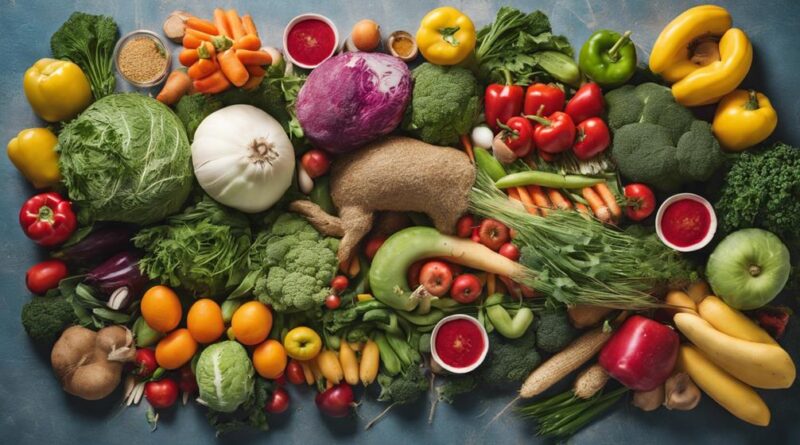Top Diet Choices for Your Rabbit's Health
You may think rabbits survive on carrots alone, but there's more to their diet than Bugs Bunny's favorite snack. Understanding the key components of a well-rounded rabbit diet can significantly impact your furry friend's health and happiness.
From the foundational hay to the occasional fruity indulgence, each element plays a crucial role in ensuring your rabbit thrives. So, let's hop into the world of rabbit nutrition and uncover the secrets to a healthy and balanced diet that will keep your bunny bouncing with vitality.
Hay: The Foundation of a Healthy Diet
When feeding your rabbit, hay forms the foundation of a healthy diet. Hay quality plays a crucial role in ensuring your furry friend receives the necessary nutrients. Opt for fresh, sweet-smelling hay that's free from dust, mold, or discoloration. High-quality hay not only provides essential fiber for proper digestion but also helps wear down your rabbit's teeth, which continuously grow.
In terms of portion sizes, rabbits should have unlimited access to hay. Provide a generous amount daily, equivalent to the size of your rabbit, to support their digestive health and prevent issues like hairballs. Remember that hay should make up the majority of your rabbit's diet, so ensure they always have a fresh supply available. Adjust the portion size based on your rabbit's activity level and weight to maintain optimal health.
Keep an eye on your rabbit's hay consumption to gauge their health and appetite. If your rabbit suddenly eats significantly less hay, it could be a sign of an underlying issue, and a vet visit may be necessary. By prioritizing hay quality and monitoring portion sizes, you're taking important steps to ensure your rabbit's well-being and longevity.
Fresh Vegetables: Essential for Nutrition
Fresh vegetables play a crucial role in providing essential nutrients for your rabbit's diet. By including a variety of fresh vegetables in your rabbit's feeding schedule, you can ensure they receive a well-rounded diet that meets their nutritional needs. Here are four important points to consider when incorporating fresh vegetables into your rabbit's diet:
- Vegetable Variety: Offer a diverse selection of vegetables such as dark leafy greens (e.g., kale, spinach), root vegetables (e.g., carrots, radishes), and bell peppers to provide a range of vitamins and minerals essential for your rabbit's health.
- Feeding Schedule: Introduce fresh vegetables gradually into your rabbit's diet to allow their digestive system to adjust. Start with small portions and gradually increase the amount over time.
- Nutritional Balance: Ensure a balance of vegetables to provide a mix of fiber, vitamins, and minerals. Monitor your rabbit's intake to prevent any nutritional imbalances.
- Portion Control: While fresh vegetables are essential, they shouldn't make up the majority of your rabbit's diet. Offer vegetables in moderation alongside hay and pellets to maintain a balanced diet.
Pellets: Providing Necessary Nutrients
To complement the fresh vegetables in your rabbit's diet, pellets are a convenient way to ensure your pet receives essential nutrients. Pellets are specially formulated to provide a balanced diet for your rabbit, containing the necessary protein balance and fiber content crucial for their health.
When selecting pellets for your rabbit, opt for high-quality brands that offer a good balance of nutrients. Look for pellets that have a protein content of around 12-14% to support your rabbit's growth and maintenance needs. Additionally, fiber is a vital component of your rabbit's diet to maintain digestive health. Choose pellets with a fiber content of at least 18-25% to aid in proper digestion and prevent gastrointestinal issues.
Feeding your rabbit a combination of fresh vegetables and pellets ensures they receive a well-rounded diet. The pellets act as a nutritional supplement to guarantee your rabbit gets all the essential vitamins and minerals they need to thrive. Remember to monitor your rabbit's pellet intake and adjust accordingly based on their individual needs and activity levels.
Water: Hydration Is Key
Ensuring your rabbit has access to an adequate supply of water is essential for maintaining their health and well-being. Hydration tips and providing suitable water sources are crucial aspects of caring for your furry friend. Here are some key points to keep in mind:
- Fresh Water Daily: Always provide fresh, clean water for your rabbit. Change the water at least once a day to prevent bacteria buildup and ensure your rabbit stays hydrated.
- Water Bottle vs. Bowl: Consider using a water bottle instead of a bowl. Water bottles are more hygienic as they prevent spillage and contamination, ensuring your rabbit has access to clean water throughout the day.
- Multiple Water Stations: Place multiple water stations in different areas of your rabbit's living space. This encourages movement and ensures easy access to water no matter where your rabbit is in their habitat.
- Monitor Water Intake: Keep an eye on how much water your rabbit is drinking. Changes in water consumption can indicate underlying health issues, so monitoring their intake is essential for early detection of any problems.
Fruits: Occasional Treats for Variety
Offer your rabbit a variety of fruits as occasional treats to add excitement to their diet. Fruit treats should be given in moderation to ensure your rabbit maintains a nutritional balance. Fruits provide essential vitamins and minerals that can complement their regular diet of hay, pellets, and fresh vegetables.
When offering fruits to your rabbit, remember to introduce new fruits gradually to avoid digestive issues. Start with small amounts and observe how your rabbit reacts before increasing the portion size. Some safe fruit options for rabbits include apples (without seeds), strawberries, blueberries, and bananas. These fruits can add variety to your rabbit's diet and serve as a healthy snack.
Ensure that the fruits you offer are fresh and thoroughly washed to remove any pesticides or chemicals that could harm your rabbit. Rotate the types of fruits you provide to ensure a diverse range of nutrients and flavors. This variety can prevent your rabbit from getting bored with their diet and encourage them to eat a wider range of foods.
Herbs: Adding Flavor and Health Benefits
Adding herbs to your rabbit's diet not only enhances flavor but also provides numerous health benefits. Herbal remedies can be a great addition to your rabbit's meals, offering both taste and wellness advantages.
Here are four ways herbs can benefit your rabbit:
- Digestive Aid: Certain herbs like parsley and dill can aid in digestion for your rabbit. They can help prevent gastrointestinal issues and keep your rabbit's digestive system healthy.
- Flavor Enhancement: Herbs like mint and basil can add a burst of flavor to your rabbit's meals, making their diet more enjoyable. This can encourage your rabbit to eat more and maintain a balanced diet.
- Immune Support: Herbs such as oregano and thyme are known for their immune-boosting properties. Including these herbs in your rabbit's diet can help strengthen their immune system and keep them healthy.
- Nutritional Boost: Some herbs like cilantro and parsley are rich in essential nutrients that can supplement your rabbit's diet. They provide vitamins and minerals that are beneficial for your rabbit's overall health.
Avoid: Foods Harmful to Rabbits

To keep your rabbit healthy, steer clear of foods that can be harmful to their well-being. When it comes to toxic plants, it's crucial to be aware of what could pose a danger to your rabbit. Plants like azaleas, rhubarb leaves, and foxglove are toxic to rabbits and should be avoided at all costs. Even small amounts of these plants can lead to serious health issues for your furry friend, so always double-check before introducing any new vegetation into their diet.
In addition to toxic plants, processed foods are also a big no for your rabbit. These unhealthy options can include sugary treats, salty snacks, and processed human foods. Rabbits have sensitive digestive systems that aren't equipped to handle the artificial ingredients and high levels of sugar and salt present in processed foods. Feeding your rabbit these items can lead to obesity, digestive problems, and overall poor health.
Supplements: When Necessary
Avoid exposing your rabbit to harmful foods, and instead, consider incorporating supplements when necessary to support their health and well-being. When it comes to supplements for your rabbit, it's essential to understand whether they're necessary or potentially harmful. Here are some key points to consider:
- Vitamin supplements: While some rabbits may benefit from vitamin supplements, it's crucial to consult with a veterinarian before adding them to your rabbit's diet. Excessive amounts of certain vitamins can be harmful to your rabbit's health.
- Balancing nutritional needs: Ensure that your rabbit's diet is well-balanced and provides all the essential nutrients. Supplements should only be considered if there's a deficiency that can't be addressed through diet alone.
- Diet variety: A varied diet is crucial for your rabbit's health. Instead of relying solely on supplements, focus on providing a wide range of fresh vegetables, high-quality hay, and a limited amount of pellets to meet your rabbit's nutritional needs.
- Consulting a veterinarian: Before making any decisions about supplements for your rabbit, it's always best to seek advice from a rabbit-savvy veterinarian. They can provide guidance on whether supplements are necessary and recommend the best course of action for your rabbit's health.
Frequently Asked Questions
Can Rabbits Eat Nuts and Seeds as Part of Their Diet?
You shouldn't feed rabbits nuts and seeds regularly. While they provide protein, they can upset your rabbit's nutritional balance and digestive health. It's crucial to focus on appropriate protein sources and portion control instead.
Stick to hay, fresh veggies, and limited pellets for a well-rounded diet. Keep nuts and seeds as an occasional treat to prevent any digestive issues and ensure your rabbit stays healthy.
How Often Should I Change My Rabbit's Water to Ensure Hydration?
To ensure your rabbit stays hydrated, change their water daily. Water quality is vital for their health.
Monitor their hydration levels by observing how much water they drink. A clean water bottle is a good option as it prevents contamination.
Alternatively, a bowl can work, but it might get dirty quicker. Remember, hydration is key to keeping your rabbit healthy and happy.
Are There Any Specific Vegetables That Should Be Avoided in a Rabbit's Diet?
When feeding your rabbit, be cautious of toxic vegetables like onions, garlic, and potatoes. These can be harmful to your furry friend.
Instead, opt for safe alternatives such as leafy greens, carrots, and bell peppers. These veggies aren't only tasty for your rabbit but also provide essential nutrients for their health and well-being.
Remember to always research before introducing new foods to your rabbit's diet to ensure their safety.
Can Rabbits Eat Dairy Products Like Cheese or Yogurt?
Yes, rabbits shouldn't eat dairy products such as cheese or yogurt. These items can lead to digestive issues and may cause calcium deficiency in rabbits.
Instead, consider offering dairy alternatives like hay, fresh vegetables, and high-quality pellets for their nutritional benefits.
Remember to prioritize your rabbit's well-being by providing a balanced and appropriate diet to keep them healthy and happy.
How Can I Tell if My Rabbit Is Getting Enough Nutrients From Their Diet?
To know if your rabbit's diet is providing enough nutrients, watch for signs of nutrient deficiency like dull fur, weight loss, or lethargy.
Monitor their diet by ensuring they have a variety of fresh hay, leafy greens, and a small amount of pellets daily.
Check with a vet to evaluate their diet and get advice on any necessary adjustments for a balanced nutrition plan.
Conclusion
Overall, providing your rabbit with a diet rich in hay, fresh vegetables, pellets, water, fruits, and herbs is essential for their health and well-being. Avoiding harmful foods and providing necessary supplements when needed will ensure your furry friend stays happy and healthy.
Remember to consult with a veterinarian for specific dietary recommendations tailored to your rabbit's individual needs. With the right diet choices, your rabbit will thrive and live a long, fulfilling life.
